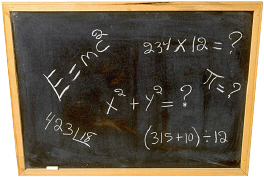Last night, I spent some time helping my daughter with her math homework (5th grade stuff). I checked her problems, and she kept getting the answers wrong on four specific multiplication problems. I'd mark them wrong and she'd go into the other room and try again. It was getting frustrating for both of us, so I decided to watch what she was doing.
 After only a couple of minutes, I recognized what she was doing - her incorrect answers were rooted a few specific issues:
After only a couple of minutes, I recognized what she was doing - her incorrect answers were rooted a few specific issues:
- she was getting distracted during the equations and sometimes skipped a step or two;
- she was writing her "carry" digits in a way that made it difficult to tell where they belonged;
- she was jumbling some of her numbers together which made it difficult to tell which ones were carry digits and which ones were part of the original equation;
- she was writing commas throughout the equations to separate the thousands places, and sometimes ended up adding the commas in as 1's when she solved the problem.
To me, as a detached observer, the reasons for the wrong answers were obvious. To her, it was vexing and not getting any better.
I was able to work with her on some changes to how she was writing down the problems, and get her to a place with fewer distractions. I then worked through the first problem with her. After that one came out right, she did the other three on her own pretty quickly.
Coaches can sometimes see what we can't
This morning, it dawned on me that I was acting as a coach in this situation. An incidental coach, perhaps, but still a coach. I was able to watch her "workflow" to determine why she was getting the wrong results, and I could see things in a way that was difficult for her. I was also able to contribute further advice and solutions based on my own experience.
She had the skills necessary to get the work done, but some of her current practices were preventing her from achieving the desired results. And it took someone else's perspective to get her to work in a more productive way.
Therein lies the value of coaching.
In math and life, technique and focus make a difference
 The other thing I realized was that the issues confronting her in doing her math problems had a lot in common with the things that keep me from being productive:
The other thing I realized was that the issues confronting her in doing her math problems had a lot in common with the things that keep me from being productive:
- when I get distracted from the tasks I should be focusing on, I tend to skip a step or two;
- when I work in a disorganized way, it's hard to figure out where to start or when I'm done;
- when I'm too close to the work, it's hard to figure out what I'm doing wrong.
Most notably, I've certainly found myself in situations where I tried and tried but didn't get the results I intended or expected.
And, I realized I've gotten a lot from coaches (both professional and incidental) over the years.
Getting lousy results? Feeling frustrated and don't know what you're doing wrong? Or, at a loss for how to fix the problems that are vexing you?
Maybe you need a coach, or a trusted advisor who can give you some outside perspective.
Related items:
